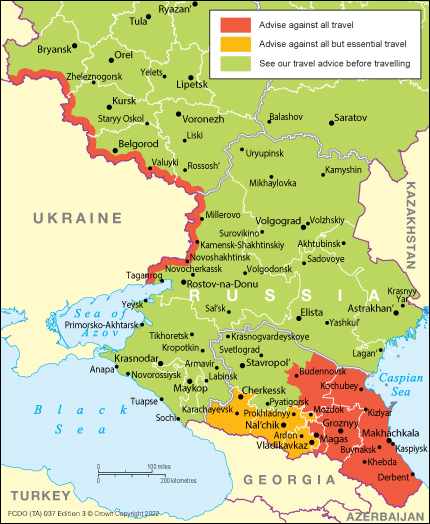Russia
Summary


The Foreign, Commonwealth & Development Office (FCDO) advises against all but essential travel to:
-
Chechnya,
NorthIngushetiaOssetia,Karachai-CherkessiaKabardino-Balkariaand(includingthe districtsElbrusofarea)
Due Budyonnovsky,to Levokumsky,the Neftekumsky,build Stepnovskyup of Russian forces and Kurskyongoing inmilitary Stavropolexercises Kraithe forFCDO securityadvises reasons.against all travel to:
-
within 20km of the border with the Ukrainian Donetsk, Kharkiv and Lugansk Oblasts and within 20km of the border with Ukraine in the Rostov, Belgorod, Voronezh, Kursk and Bryansk regions due to the build up of Russian forces and ongoing military exercises.
regions.
TheIn Foreign,addition, Commonwealthand &for Developmentsecurity Officereasons, (the FCDO) also advises against all but essential travel to:
- North
Chechnya,Ossetia,IngushetiaKarachai-Cherkessia and Kabardino-BalkariaDagestan(includingandthe Elbrusdistrictsarea)ofBudyonnovsky,Levokumsky,Neftekumsky,StepnovskyandKurskyinStavropolKrai
COVID-19 entry restrictions for Russia
Before you travel, check the ‘Entry requirements’ section for Russia’s current entry restrictions and requirements. These may change with little warning. Monitor this advice for the latest updates and stay in contact with your travel provider.
Travelling from and returning to the UK
Check what you must do to travel abroad and return to England, Scotland, Wales or Northern Ireland.
If you plan to pass through another country to return to the UK, check the travel advice for the country you’re transiting. If you will pass through a red list country, book your hotel quarantine package before travelling to the UK.
If you’re planning travel to Russia, find out what you need to know about coronavirus there in the Coronavirus section.
During the COVID-19 pandemic, it is more important than ever to get travel insurance and check it provides sufficient cover. See the FCDO’s guidance on foreign travel insurance.
For information about COVID-19 vaccines, see the Coronavirus page.
Following the nerve agent attack in Salisbury on 4 March 2018, there are heightened political tensions between the UK and Russia. While the British Embassy in Moscow is not aware of any increased difficulties for British people travelling to Russia, you’re advised to remain vigilant, avoid any protests or demonstrations, and avoid commenting publicly on political developments.
Terrorists are very likely to try to carry out attacks in Russia. See Terrorism.
The UK doesn’t recognise Crimea as being part of Russia. See the Ukraine travel advice page for details.
Political rallies and demonstrations can occur in Moscow, St Petersburg and other places across Russia. Check the local media for the latest information, be vigilant, and avoid any demonstrations. See Political situation.
You should be aware of the risk of street crime. See Crime.
According to the Federal Agency for Statistics, British nationals made around 22,471 visit to Russia in 2020. Most visits are trouble-free.
Small earth tremors are recorded throughout the year without consequences. To learn more about what to do before, during and after an earthquake, see the website of the US Federal Emergency Management Agency.
Consular support is severely limited in parts of Russia due to the security situation. The North Caucasus remains an unstable and potentially dangerous region. The Russian authorities take a particularly strict attitude towards security, as well as compliance with visa and registration rules. Short-term travel restrictions are sometimes applied in relation to ongoing security operations. These are publicised at very short notice, if at all. Cross-border traffic with Georgia and Azerbaijan is also subject to restrictions. See Local travel.
If you’re abroad and you need emergency help from the UK government, contact the nearest British embassy, consulate or high commission.
You can contact the emergency services by calling 112.
The Overseas Business Risk service offers information and advice for British companies operating overseas on how to manage political, economic, and business security-related risks.